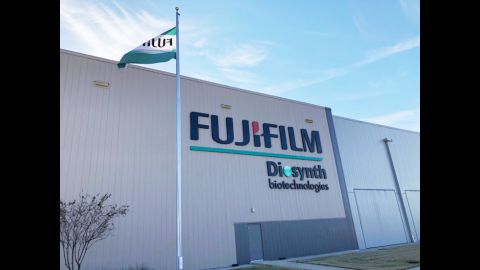
Corporate officials of College Station’s FUJIFILM Diosynth Biotechnologies (FDB) plant have announced they will build a more than $2 billion dollar facility near one of their existing United States locations.
CEO Martin Meeson tells WTAW News that FDB has locations in more than 25 states. Meeson says the goal is to reduce their list in a few weeks and select a site by the end of the first quarter.
The new facility will begin operations in the spring of 2025.
Meeson says “we are going all the way from starting the developmental process to producing that product to getting it in the vial or the syringe or the cartridge, whatever the kind of delivery format is. It will be labeled and then it will be boxed up and then our partners will take and distribute that out.”
The president of the Brazos Valley Economic Development Corporation Matt Prochaska, tells WTAW News “rest assured, we’ll be competing aggressively for the project.”
Prochaska says BVEDC and its partners have two advantages. One is knowing the competition, and second is FDB’s current presence in the College Station/Bryan corridor. That includes $120 million dollars in current and recent expansions. One of the projects is associated with mass production of the Novavax coronavirus vaccine when that candidate is approved.
News release from FUJIFILM Diosynth Biotechnologies:
FUJIFILM Corporation (President: Kenji Sukeno) is making an investment of more than 200 Billion yen (2 Billion USD) to establish a new large-scale cell culture production site in the United States to accelerate the growth of its biopharmaceutical contract development and manufacturing business (CDMO).
FUJIFILM Diosynth Biotechnologies, a subsidiary of FUJIFILM Corporation, with development and manufacturing facilities across the U.S.A., U.K., and Denmark will operate the new facility. This new facility will offer large-scale cell culture manufacturing of bulk drug substance with 8 x 20,000L bioreactors (physical volume), with the potential to expand and add a further 24 x 20,000L bioreactors based on market demand. In addition to drug substance manufacture, the facility will also provide commercial scale, automated fill-finish and assembly, packaging and labeling services. The new site will be built within the vicinity of an existing Fujifilm site, and is scheduled to begin operations in the spring of 2025.
“The United States is the world’s biggest market for biopharmaceuticals. I am pleased that through this large investment in the U.S.A we are able to support the development and manufacturing of new drugs that can help fulfill unmet medical needs”, said Kenji Sukeno, president of FUJIFILM Corporation. “Fujifilm will continue to promote human health and support the progress of the healthcare industry by using our cutting-edge technology and advanced facilities to provide a stable supply of high quality biopharmaceuticals.”
Fujifilm is actively investing to enhance and grow its end to end service offerings across all of its Bio CDMO sites. Most recently (June 2020) FUJIFILM Corporation invested 100 billion yen (928 million USD) in FUJIFILM Diosynth Biotechnologies’ Hillerød, Denmark site to double its large-scale cell culture manufacturing capacity and add commercial scale drug product production capabilities.
“We are leveraging our strengths in process development and manufacturing for a wide range of biopharmaceuticals such as antibodies, recombinant proteins, gene therapies and vaccines,” said Martin Meeson, chief executive officer at FUJIFILM Diosynth Biotechnologies. “We are uniquely placed to support our customer supply chain needs providing end to end services from small to large scale bulk drug substance production, through to fill-finish and final packing.”
Fujifilm has set a target to achieve an annual revenue of 200 billion yen for its Bio CDMO business* by fiscal year ending March 2025. Beyond fiscal year ending March 2026, Fujifilm expects this latest investment to boost the annual growth rate of its Bio CDMO Business to 20%, greatly exceeding market projections. Going forward, Fujifilm will continue to contribute to the healthcare industry by providing a stable supply of high quality pharmaceuticals.
Click below to hear comments from Martin Meeson and Matt Prochaska, visiting with WTAW’s Bill Oliver.
